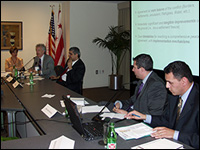Registration
You will receive an email confirming your registration.
IMGXYZ796IMGZYXEvent transcript posted to the right.
Maen Areikat, Gregory Khalil, and Khaled Elgindy presented Palestinian perspectives and expectations towards the proposed Middle East peace summit in Annapolis. After Mr. Areikat’s overview, Mr. Khalil described the unprecedented opportunity given the backing for a peace agreement by a majority of Arab states as well as the scary prospect of Gaza in 2020 if there is no progress. There are three components the Palestinian leadership consider necessary for an agreement: a document resolving core issues, tangible improvements on the ground, and a timetable moving forward. Since the Camp David summit, there have been substantive failures in advancing Palestinian statehood, due to limitations imposed by Israelis concerning access to roads and control over air space, land, and water resources.
Mr. Elgindy followed up by outlining Palestinian expectations of deliverables and timelines. At the core is the implementation and verification of a settlement freeze in response to the recent intensification of settler activity. There has been a 30% increase of Israeli settlers in the West Bank since 2000 and the gradual institutionalization of enclosure through the construction of a separate road network for Palestinians. During this time, East Jerusalem has also become increasingly cantonized.
The discussant was Carnegie Senior Associate Nathan Brown, who commented on the continuation of the desperate situation and the raised the issue of the internal Palestinian split. A solution to the Palestinian issue has been urgent for decades now considering the demographic and social context, but this has not yielded results. With the current Hamas/Fatah split in Palestinian leadership, Dr. Brown raised the question of whether the current peace process model was still applicable, or if new, longer-term thinking was necessary.
In his reaction to the Dr. Brown, Mr. Areikat underlined that President Abbas was the legitimate president of all Palestinians, and recent events in the Palestinian territories amounted to a factional war, not a full civil war. Furthermore, what solution is possible beyond the two-state solution?
Questions from the audience touched on issues including timetables and monitoring, the distance between Israel and the Palestinians in 2000 versus today, and how to reconcile the peace process with support for Hamas.
